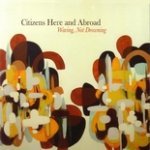
Citizens Here and Abroad Waving, Not Drowning
(Turn Records)
You may have encountered Citizens Here and Abroad on their UK tour late last year, or on their well regarded first outing, Ghosts of Tables and Chairs, from 2005. Or you may have seen their singer and guitarist Adriene Robillard and other guitarist, Daniel Lowrie in their other incarnation, Secadora. Even if you haven't, Waving, Not Drowning will sound really rather familiar. Not just the misquote from one of Hull's most famous products that provides the title, nor the lyrics - drink, drugs, sex, gambling, failed and failing loves. No, what's most familiar is that this is a good, old-fashioned indie album. Yes, indie, no more and no less.
When I say indie, I should perhaps classify: we are not talking Britpop, nor its earlier incarnations in Dudley or Manchester. What Citizens... offers is a transverse cut through those years some time before Nevermind when bands from mediocre suburbs in the USA made unsettling, clever, energetic rock 'n' roll that drew on punk and surf rock; meanwhile, on these isles, kids from Glasgow and Dublin were putting guitars through blenders while the pale one in the band sang as if embarrassed to be doing so.
The most distinctive feature of Citizens is the duelling counterpoint between different musical elements: the vocals of Chris Groves and Robillard; Lowrie's garage guitars against Chris Wetherell's primitive drums. Robillard's voice is reminiscent of Kim Deal, or maybe even Suzanne Vega; this is immediately obvious from the promising opener, Stranger. I've hinted at a tendency toward shoegazing, and this is manifested in the way tracks often drift off in the middle; at times there's a subterranean menace to this as Wetherall's drumming and Grove's bass suggest an oncoming surge but on a couple of tracks - Accelerator is one - it simply stays off. Secret is one of the best cuts here, rightly picked out by bloggers, although no one, as far as I can tell, has mentioned how much it sounds like early Voice of the Beehive. Hints of Sonic Youth appear on Deer in the Headlights, while the lurking nastiness of Nerves is redolent of, you've guessed it, The Pixies.
The track that struck me most was The Neighbours Called the Police. All the elements are here: the competing, complementary vocal lines, the heartbeat of the rhythm section, a hint of Cocteau Twins. Most importantly, it's a genuine grower of a track, and perhaps the only one that truly benefits from, and surpasses, the burden of familiarity. In sum, then, an album that is not as great as the sum of its influences, but urgent and heartfelt enough to be more than an exercise in nostalgia.
19 March, 2007 - 21:55 — Ben Bollig